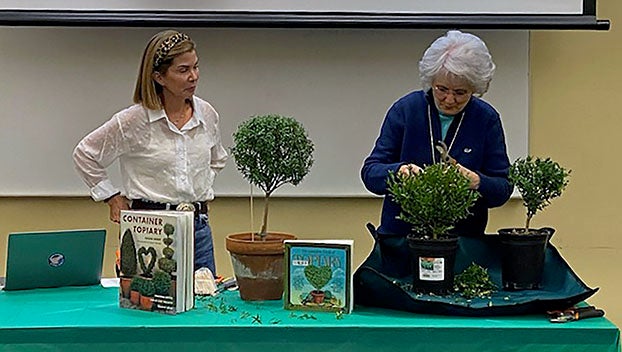Through the Garden Gate: Garden Clubs — Not just who raised the best rose
Published 12:54 pm Friday, June 2, 2023

- The November 2022 meeting of the Nora Lancaster Garden Club featured a workshop on bonsai led by Kendall Riggin. Brenda Puryear practiced shaping a plant.
|
Getting your Trinity Audio player ready...
|
There is a long history of clubs just for men – social, botanical, historical, culinary, even ones for explorers. Unfortunately, that hasn’t been the case f+or women. It wasn’t until the late 1800s when women were better educated and began searching for leadership opportunities that clubs exclusively for women began to develop. Women’s clubs, including garden clubs, developed as places where women could assume leadership roles, have an impact on their communities, and wield social power.
The first garden club for women was founded in Athens, Georgia in the 1890s. Others soon followed. Garden clubs became popular because they offered a socially acceptable activity for women. Regular meetings featured educational programs and opportunities for women to demonstrate their creative talents. Topics routinely included the elements of garden design, the care of house plants, and the protection of native plants. Magic lantern slide shows were especially popular. Around the same time, the judging of artistic floral arrangements and garden specimens became an integral part of club programs.
Although garden clubs have frequently been dismissed as mere social outlets for bored women with too much free time, these organizations have an impressive record of reshaping their communities. These clubs served as entry points for women to become engaged in social movements. Over the years, they promoted voter registration, convinced local and state governments to beautify public areas, raised money to save historic properties, and urged the protection of endangered plants.
Garden clubs lobbied for the preservation of the redwoods in California, as well as the protection of native plants in Petersburg, Virginia. One early garden club member was famous for waging a very personal campaign against billboards blighting rural roads. She would venture forth with a driver and an axe and attack billboards near where she lived. Other more low-key efforts of many garden clubs eventually resulted in the removal of more than 96,000 billboards, as well as the passage of legislation to limit their use.
By the early 1900s, garden clubs in Virginia were providing educational opportunities for members and also engaging in conservation and beautification activities. In 1920, Mrs. Thomas Wheelwright, President of the James River Garden Club, called together the leaders of eight clubs to discuss the formation of a federation to leverage their influence. The result was the creation of the Garden Club of Virginia.
Their early efforts focused on the beautification of roadsides and the protection of native flora. In 1929, the Garden Club of Virginia sponsored the first Historic Garden Week to raise funds for garden-related research and restoration. Kenmore, the home of Colonel Fielding Lewis and Betty Washington Lewis, was the first recipient of funding and technical expertise. Landscape architects Charles Gillette and Arthur Shurcliff used historical documents and archaeological finds to create gardens there that evoked the colonial era. Historic Garden Week is still a much-anticipated spring event that enables visitors to tour private gardens and homes filled with fabulous floral arrangements while raising funds for graduate research fellowships, the support of Virginia State Parks, and the ongoing restoration of historic gardens.
Here in Farmville, there are six garden clubs: the Longwood Garden Club, which is one of the oldest in the state; the Heritage Garden Club; the Nora Lancaster Garden Club, which was founded in 1952; the Weyanoke Garden Club, which was also founded in 1952: the Ruth Adams Garden Club, which was founded in 1979 and is a member of the Garden Club of Virginia; and the Garden Study Club, which is also a member of the Garden Club of Virginia. The Gray Carter Garden Club ceased to meet in 2020. In addition to the clubs in Farmville, there are three in Cumberland – The Red Bud Garden Club, The Cumberland Garden Club, and the Cartersville Garden Club. In Buckingham, the Buckingham Dillwyn Garden Club in Buckingham is celebrating its 90th birthday this year and is known for its floral design programs.
Each club has a unique personality and a passion for particular types of projects. They all help make the local community a better place to live.
Dr. Cynthia Wood is a master gardener. Her email address is cynthia.crewe23930@gmail.com.




